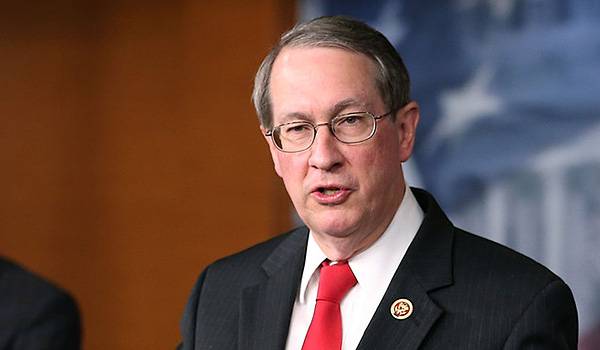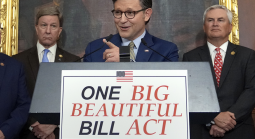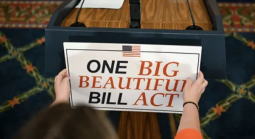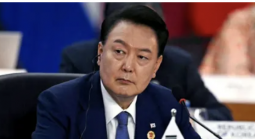Father of Most Unethical Gambling Law, Bob Goodlatte, Wanted to Gut Ethics Committee
Rep. Bob Goodlatte (R-VA) kicked off the New Year with a proposal that would have nullified the independent nature of the Office of Congressional Ethics. Brian Saady has a piece below you will not want to skip over. Check out his blog here and watch for his upcoming book.
Goodlatte’s amendment banned the Office of Congressional Ethics from accepting anonymous tips about members of Congress. It was passed that same evening, January 2nd. However, there was an immediate and adverse bipartisan reaction. The hashtag (#ethics) was a trending topic on Twitter and even President-elect Trump criticized this decision the next morning with a tweet. Later that afternoon, the House Republicans overturned Goodlatte’s amendment. Suffice it to say, this was a victory for common sense and the democratic process.
Bob Goodlatte has a history with flawed ethics. Case in point, let’s examine the first federal law that banned Internet gambling. As you may remember, the offshore gambling industry was a growing phenomenon in the late 1990s. Throughout the Caribbean and Latin America, numerous companies established their businesses in countries where gambling was permitted. These upstart enterprises offered sports betting and online poker for American gamblers. Consequently, it left many people wondering if this type of gambling was a legal option for American consumers. Hence, Bob Goodlatte and his counterpart, former Sen. Jon Kyl (R-AZ), attempted to ban Internet gambling to eliminate the ambiguity. They eventually succeeded, but they compromised their ethics along the way.
Goodlatte and Kyl introduced the “Internet Gambling Prohibition Act of 1997.” Their bill was a simple, principled attempt to ban all forms of Internet wagering. Their bill not only targeted the companies involved with Internet gambling, but it also would have created the first federal charges for anyone placing a bet online. Yes, even casual bets via the Internet among friends would have been subject to a felony offense. Needless to say, their bill didn’t have much support in a country where roughly one out every six people bet on sports at least once a year. Nevertheless, Jon Kyl succeeded by attaching his proposal to an appropriations bill. On the other hand, Goodlatte’s version of the bill never made it out of committee in the House.
Goodlatte and Kyl wrote a follow-up bill, “Internet Gambling Prohibition Act of 1999.” This removed the penalties for the people placing bets online. Goodlatte and Kyl also compromised for various special interest groups by providing exceptions for horse racing and fantasy sports. Regardless, Goodlatte didn’t seem confident that his bill would be passed through the normal legislative process. He used a rather sneaky method by placing it on the suspension calendar, which avoids an open debate on the floor. This is an unusual practice utilized in the House of Representatives that is supposed to be only used for non-controversial legislation because the normal rules are suspended. Hence, a two-thirds majority is required. Ultimately, this ploy didn’t work because an even more unethical foe, the notorious lobbyist Jack Abramoff, used several dirty tricks to defeat Goodlatte.
Goodlatte and Kyl proceeded with a new method for banning Internet gambling. They supported an indirect approach written by former Rep. Jim Leach (R-IA), the “Internet Gambling Funding Prohibition Act of 2001.” Leach’s plan would have banned any method of funding Internet gambling sites. Congress didn’t pass Leach’s bill either, but Goodlatte agreed that this was the best course of action. He introduced the “Internet Gambling Prohibition Act of 2006,” which was very similar to Leach’s bill.
Rep. John Conyers (D-MI) publicly questioned the anti-gambling nature of the bill because there was an exception for horse racing. He also seemed to be insinatating that Goodlatte wasn’t being completely forthcoming about the details of his bill. Goodlatte responded by testifying that his bill didn’t create “a carve-out” for Internet horse racing, at least according to his knowledge. In turn, Conyers read aloud a written statement from a spokesman of the DOJ, Bruce G. Ohr, while Ohr and Goodlatte were in attendance. Bruce G. Ohr had written that Goodlatte’s bill “would change current law and amend it to permit the interstate transmissions of bets or wagers on horse racing. This proposal would weaken existing law.”
After listening to his own statement, Ohr responded by noting that Goodlatte didn’t intend to create an exception for horse racing. But, he acknowledged that Goodlatte’s bill did create such an exception. Nonetheless, Ohr tried to assure Conyers that he would work with Goodlatte to make sure that Internet wagers on horse racing would be prohibited. Understandably, this response visually frustrated Conyers who only wanted to settle the matter at hand. “This is a very unusual situation, Mr. Chairman. We’ve got the Department of Justice representative telling us that what he has submitted to the committee is not accurate because he has talked to Chairman Goodlatte and they’ve gotten it straightened out,” said Conyers. He later added, “This is a heck of a way to a conduct a multi-billion subject matter before us...either there is a carve-out here, which is widely regarded to exist, or there isn’t.”
In the end, the Internet Gambling Prohibition Act of 2006 was not passed even though the Goodlatte and Kyl duo labeled it as an “anti-Jack Abramoff” proposal. The appearance of impropriety and conflicts of interest were not lost on legalized gambling activists who exposed the hypocrisy. Astoundingly, this anti-gambling crusader, Goodlatte, had accepted donations from the horse racing industry. After facing public scrutiny, Bob Goodlatte returned the campaign contributions that he received from the National Thoroughbred Racing Association. However, his PAC did not refuse donations from the horse racing industry during the next political cycle.
Goodlatte’s pet project eventually came to fruition when Congress passed the Unlawful Internet Gambling Enforcement Act of 2006 (UIGEA). The UIGEA was essentially the same as Goodlatte’s proposal and it provided exceptions for horse racing, lotteries, fantasy sports, and other forms of gambling. This federal law wouldn’t be in place today without a few Congressmen crossing some serious ethical boundaries. The UIGEA was attached to an unrelated terrorism bill, the Safe Port Act of 2006, on the final day of Congress before the election. Granted, it wasn’t Bob Goodlatte who attached the UIGEA to the Safe Port Act. It was former Sen. Bill Frist (R-TN) who thought it would help his chances at a presidential run. Nonetheless, we can safely say that Bob Goodlatte has no place in deciding the ethical rules for Congress.
Brian Saady, Gambling911.com Special Contributor















